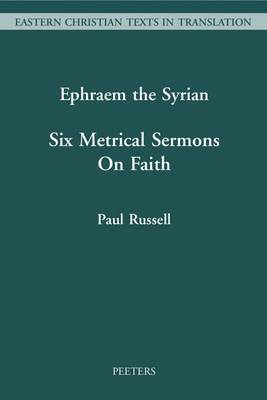Eastern Christian Texts in Translation
2 primary works
Book 3
Ephraem the Syrian (+ 373) is the brightest light in the Syriac-speaking Christian tradition. A hymnographer, homilist, exegete and theologian of great ability, his works provide a window into a sphere of early Christianity too little known to modern readers. This collection of hymns, many of which show Ephraem's involvement in the debates stemming from the Arian Controversy, contain much of his most fully articulated theological writing. Approaching these fundamental topics from a point of view quite different from his Greek and Latin speaking contemporaries, Ephraem discusses the nature of God and creation, the usefulness and limits of theological language, the revelation of God in Scripture and nature, as well as providing detailed discussions of questions of Christology. This collection offers not only an opportunity to hear a new voice from the Christian past, but also demonstrates that high level, technically adept theological writing can be couched in clear, poetic style with much use of imagery and symbols. Students of the Middle East will discover much information here about the religious currents active in the region during the Late Antique period. The volume includes indexes of scriptural references, theologically significant Syriac words (with all their appearances noted) and of topics and themes addressed. These are designed to increase the volume's usefulness for teaching, especially for students innocent of Syriac.
Book 4
The metrical sermon was an important theological and evangelical instrument among Christians of the Syriac-speaking tradition in the Late Antique period. Ephraem the Syrian (+ 373), the greatest of the writers of Syriac and the formative voice of that tradition, uses this medium to address many matters fundamental to his vision of christianity and of immediate concern to the Christians of his time and place. These six sermons contain interesting meditations on the nature of revelation in Scripture and its proper understanding, the meaning and correct expression of the Nicene christological position, the connection between religious life and progress in theological understanding and the difficulties besetting the Church of his time (the sixth showing evidence of the Persian attacks on Nisibis). These sermons demonstrate the clarity and acuity of which verse is capable when in the hands of a master and offer the modern reader a fresh, powerful voice from early Christianity. The volume includes indexes of scriptural references, theologically significant Syriac words (with all their appearances noted) and of topics and themes addressed. These are designed to increase the volume's usefulness for teaching, especially for students innocent of Syriac.

